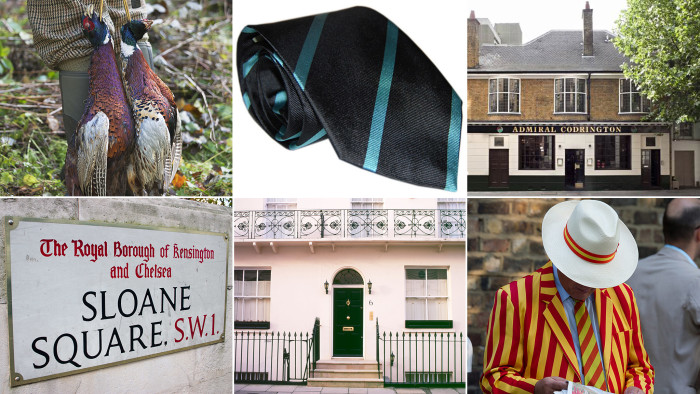Will the UK’s new mansion tax spell the end for ‘Sloane Rangers’?

Simply sign up to the Life & Arts myFT Digest -- delivered directly to your inbox.
Henry, 34, is an English type. Once he was ubiquitous in the posher parts of London but now he is a rare breed – endangered, even.
Historically, Henry would have been “upper class”. He was sent to a private school and lives in Chelsea, a “toff” part of west London. His family set foot in Chelsea the year Henry VIII beheaded Sir Thomas More (local resident, c1525-1534). Henry’s forebears include other “toff” types such as Burlington Bertie (c1900), Champagne Charlie (c1940) and Hooray Henry (c1950). He is not unlike PG Wodehouse’s Bertie Wooster – but Henry doesn’t know this, because he only reads back issues of Country Life.
Both of Henry’s parents were Sloane Rangers – horsey people with public school voices, identified in The Official Sloane Ranger Handbook (1982) by Ann Barr and Peter York. Thirty-odd years ago, the Sloane Rangers dominated Chelsea.
And Henry is something of a Sloane, as well. For example, he was born within a spit of Sloane Square and lives in the home he inherited off the King’s Road. When life is good, he wears mustard socks, plum corduroys, loafers and tweed. When he laughs, he sounds like a donkey.

Yet Henry isn’t rich. His education (Eton, Oxford) didn’t prepare him for a job and he is – as always – unemployed. He just hopes to live for a bit longer and die inside The Admiral Codrington, his favourite pub.
But that was before someone dreamt up The Mansion Tax.
The Liberal Democrat party proposed it in 2009. Homes worth more than £2m would be taxed at 1 per cent of their market value above the £2m threshold, meaning that the owner of a £3m house would pay £10,000 a year. In 2013, the Labour party announced that it, too, would impose a mansion tax. The tax could raise about £1.7bn a year.
It’s bad news for Henry. His house – bought for “nothing” by his parents in 1961 – is worth £5m (through no fault of Henry’s). With the mansion tax, he will have to pay £30,000 every year to live at home. “And it’s not even a mansion!” cries Henry.
Nevertheless, most people agree that the way property is taxed in Britain needs to be updated.
“The tax system has got to be fairer,” says Liberal Democrat MP Greg Mulholland. “Currently a very wealthy person with a property worth £3m pays the same council tax as a family in a three-bedroom home worth one-quarter of the price.”
For Mulholland and his party, mansion tax is part of the answer. On paper, however, the tax looks hazy.
“It’s so short on detail, that it’s almost useless,” fulminates Charlie Ellingworth, a founder of buying agent Property Vision.
It’s hard to determine how many homes could be affected. Mulholland suggests 70,000 but property consultant Knight Frank gives 95,000, saying “no one knows for certain”.

There’s also a “logical inconsistency,” adds Ellingworth: if your £2m house is valued at £2m the fact that it’s valued at “£2m makes it worth less than £2m”. And that word “mansion” sparks fury.
“They’re calling it a mansion tax but it’s nothing to do with mansions,” says Ellingworth. “I mean £2m now is by no means a mansion, certainly not in London. It’s a one-bedroom flat in Lennox Gardens.” (Or a six-bedroom house in Newcastle upon Tyne.)
Mansion tax is a form of wealth tax, apparently. “It just happens to be based on houses, which people find difficult to run away from,” says Ellingworth.
Trevor Abrahmsohn, managing director of Glentree International, has sold £2.4bn of property since 2004. Clients have included kings from Nigeria, Saudi princes, Bernie Ecclestone, Ringo Starr and Lulu. He is not shy of making sentimental statements – “the world I want to be in is the giving world not the taking world” – and he’s not shy of taking a strong view.

“Mansion tax is a pseudonym for home tax,” he says. It is a “Machiavellian conspiracy” cooked up by politicians who “pander” to their socialist supporters. “Maybe this is about propagating the politics of envy.”
Maybe. Or maybe not. But is it very frightening?
The most frequent and emotive argument used against the mansion tax involves a widow.
“Take the widow that bought a house 30 years ago with her husband,” says Abrahmsohn. “He has subsequently died. Her house is worth £5m and she’s being asked to pay £60,000 gross.”
Here, the Lib Dems have attempted to be reassuring. “The policy ensures that those who are vulnerable, such as pensioners or those on low incomes, are not affected since [payment of] the tax is delayed until their property changes hands,” says Mulholland.
Abrahmsohn is not reassured. “That lovely old dear had planned – after death duties [inheritance tax] – to distribute that money to her family. She hadn’t intended for the entire amount to go to the government or the council.”
Yet Henry does feel reassured. He works out that if he delays his annual whack of £30,000, he has almost 167 years before his home is owned by the government. Or maybe less, depending on interest rates. At any rate, he reckons he’ll be dead within 40 years, so he’ll be fine.
But others might have to sell up – and then Sloane Square could be de-Sloaned.
“I think the Sloane Ranger is pretty extinct already,” says Ellingworth. “The classic Sloane Ranger was never hugely rich. They were normally sort of nice county people who came to London and had perfectly ordinary jobs – and I don’t think anybody on a perfectly ordinary job can afford to live in Chelsea.”
Apparently the “classic” Sloane Ranger has been colonising parts of (cheaper) London – including Fulham, Clapham, Wandsworth, Balham and Battersea – for years.

Yet not everyone is as pessimistic as Ellingworth. I ask James Pace, head of Knight Frank’s Chelsea office, if the Sloane Rangers are faring well on his beat.
“Unquestionably,” he says. “There’s a relatively low turnover of property because people tend to stay in the area . . . Russians like to buy big, ostentatious properties and you don’t really get them round here.”
And does the idea of a mansion tax spook potential buyers? Not really, says Pace.
Liam Bailey, head of residential research at Knight Frank, is inclined to agree: “In the absence of certainty, the market appears to have continued relatively unaffected.”
But Abrahmsohn is forthright. “The spectre of mansion tax is a very damaging black cloud that sits over the market,” he says. “UK buyers are significantly worried about it.” Pace would disagree, I venture. “Bless him. Either he’s been told to say that or he doesn’t know what he’s talking about.”
So what will happen after mansion tax is born?

“Carnage,” says Abrahmsohn. “Property prices will fall dramatically, loans will go into default, there’ll be a stagnant market . . .”
There might also be some litigation over property valuations. And certain foreign “wealth creators” (Abrahmsohn’s phrase) might choose to create wealth abroad. But no one really knows.
More importantly, is there any hope for the cash-poor/asset-rich Henrys unlucky enough to inherit capital?
A solution would be to impose the tax “on the price you paid, not on the price of a valuation”, suggests Ellingworth. Then you’d be “catching the oligarch as he’s coming in and leaving the little old lady behind”.
A different Henry vows he’ll “take to the streets” if a mansion tax is imposed. Failing that, he’ll emigrate.
Take to the streets? “I’m sure they would,” says Abrahmsohn, “but I’m not sure how many governments would be so terrified of that.”
Well, an army of Henrys is patently terrifying. “I just don’t think that will happen,” remarks Ellingworth drily. What about emigration en masse? “I wouldn’t have thought so. I mean what’s the alternative – you go and live somewhere ghastly like Monaco?”
So maybe a mansion tax won’t signal The End of All Things. Even for Henry.
Anyway, Henry’s type have tended to adapt – and to look after their own. Tucked inside The Admiral Codrington, bravely – nobly – Henry lives in hope.
Photographs: Alamy; Corbis; Getty; Dreamstime
——————————————-
Letters in response to this article:
Mansion tax will severely distort the property market / From Mr William Jack
Mansion dwellers may not be wealthy/ From Mr Patrick Way QC
Comments